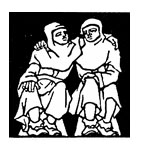
Pretending to Be a Monk?
GUEST COLUMN
It is almost beyond comprehension that the Spanish monks of Silos have hit the top of the charts with their album and compact disc, Chant. A generation ago a few tapes would have been sold at the monastery shop and might be sent to some affiliated associations for a modest total of sales. The recording is good and the sound pleasant, but the purists at Solesmes and other experts would be quite critical of a certain lack of precision and an occasional drop in pitch. In short, the success of Chant is a phenomenon that few can explain except that it is peaceful, exotic, and in a language that few understand.
Another sign of the times is that among some New Age people, it is considered “cool” to visit monasteries, whether they be Christian or Buddhist. The Cloister at Silos has been disrupted and inundated with tourists who wish to become part of “the scene.” Perhaps the fascination with monasticism is connected with the exotic quality of monks’ lives, the tranquility, the strange sounding liturgical language, and the possibility of finding a way of feeling at one with the universe. Dostoevsky was right when he asserted that most human beings want and need “miracle, mystery, and authority.” Monastic discipline represents authority, while the chant provides the mystery. But the miracle comes when people are changed.
I wonder if the New Age listeners are aware of the meaning of the chants and whether they would be so enthralled if they knew that the translation of the motet “Christus factus est” is “Christ became obedient for us even to death.”
You May Also Enjoy
The Buzzing of the Hive... Beyond the Reef... Ecclesiological Solipsism... Shameful Talk... Mexico’s Malfeasance... The Awesomeness of the Moment... Catholic Evolutionists’ Big Lie
According to Pope Leo XIII, Anglican Orders are "absolutely null and utterly void." That makes the Anglo-Catholic "Eucharist" invalid, too.
Christian teachers who feel overwhelmed can remember that, if they are using well the gifts God has given them, good things are being done amid their busy-ness.

